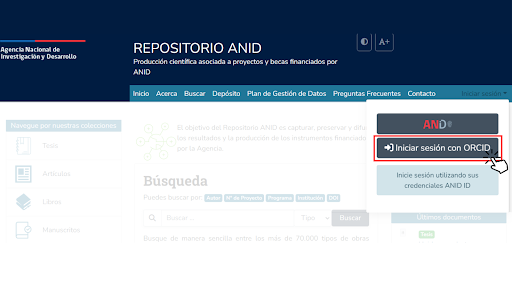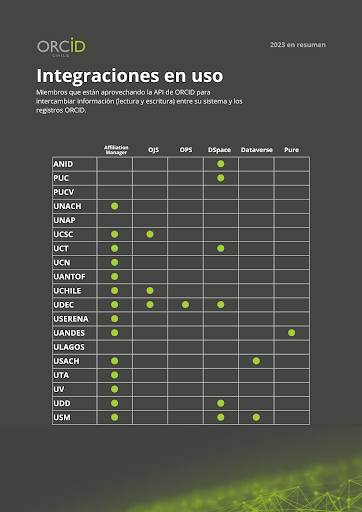We recently shared ORCID’s efforts to expand communities of practice in Latin America in our blog A Look at the Past to Strengthen ORCID’s Future in the Latin American and Caribbean Region. We continue to make strides to grow a region- and sector-based community of practice approach, driven by our network of partners and consortia, which ties into one of ORCID’s four strategic priorities outlined in From Vision to Value: ORCID’s 2022–2025 Strategic Plan—Increasing Global Participation.
In this blog, we will highlight the efforts of the ORCID-Chile Consortium formed by CINCEL in 2022, which brought together 17 higher education institutions plus a government agency (National Research and Development Agency‚ ANID).
In March 2024, the ORCID-Chile consortium celebrated two years of operation. During this time, it has made important progress in two main areas: the implementation of integrations and improving communication with their consortium members.
Implementation of integrations

One of the main goals of the consortium is to facilitate the adoption of ORCID by the Chilean scientific community. To this end, it has worked on implementing integrations with research-relevant systems and platforms, such as research information systems (mainly CRIS), manuscript submission systems (e.g. OJS), and repository systems (e.g. DSpace). Since June, their technical staff has worked closely with member institutions that requested technical advice and, in coordination with technical support from ORCID, increased the number of their integrations from 12 to 28.

In this area, the consortium has made significant progress. In 2023, 73% of their members took advantage of ORCID’s Affiliation Manager—the consortia-only tool that allows ORCID consortia members to add affiliation data to ORCID records without the need for technical integration. The University of Concepción completed four integrations (see table), the ANID institutional repository (repositorio.anid.cl) allows authentication using ORCID iD (see image) and six institutions implemented integrations with DSpace.
These advances have allowed Chilean researchers to create and maintain their ORCID records more easily and efficiently. For example, integrations with DSpace allow researchers to link their ORCID records to their research data automatically.
Focus on communication

The consortium has also worked with a focus on communication with consortium members. To this end, it has implemented a communication plan that includes the dissemination of information through various channels, such as newsletters, social networks, and dissemination at academic meetings. Activities such as the resources provided by ORCID and the monthly statistical reports have been very useful.
In 2022, the consortium launched a monthly newsletter (subscribe here) that shares information about ORCID, reports on progress, and promotes technical advice. In addition, there is continuous participation in meetings on open science, reflecting the adoption of persistent identifiers in the Chilean academic ecosystem.
New challenges and opportunities
In the near future ORCID-Chile already sees new challenges and opportunities. María Soledad Bravo-Marchant, executive secretary of Consorcio CINCEL, was elected as an ORCID Board member for the period 2024-2027, thus contributing to Latin American representation in this body. Likewise, a short-term objective is to exceed 20 members and provide them with the support they need to facilitate the adoption and use of the ORCID identifier by the Chilean scientific community.
Members in 10 of the 16 regions of Chile are already taking advantage of the benefits of being part of this ORCID community of practice. And the Chilean consortium would like to invite more institutions to join them and enjoy ORCID Premium and Consortium Membership benefits, which grants five member API credentials, technical support, training, among others. If your institution is interested, we invite you to contact: [email protected] for more information or to request the incorporation of your institution to the consortium.
Contributor
María Soledad Bravo Marchant

María Soledad Bravo Marchant is an ORCID Board member and Chilean journalist from the Universidad Católica de Chile who has vast experience in the design and implementation of policies, instruments and programs related to scientific information. She is currently in charge of the Scientific Information Unit in the Networks, Strategy and Knowledge ANID’s Sub-Directorate, an entity that commands the implementation of the National Infrastructure for Access to Scientific Information and the ANID Open Access Policy. She also leads the ORCID-Chile Consortium. Prior work includes the Ministry of Communications and Press, the Ministry of National Patrimony, and the Ministry of Education designing and implementing communication policies, coordinating specialized work teams in processing, systematization and publishing of information on public policies, programs and specific laws. In the private sector, she has coordinated multidisciplinary teams for electronic content management with focus on science, technology and innovation, and the higher education system.